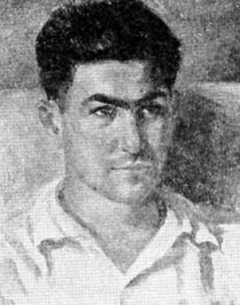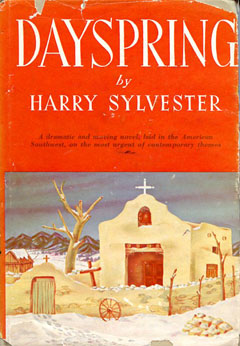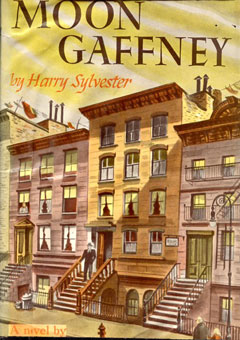Harry Sylvester's Bad Catholics
(July 7, 2012)
I wish I could include Harry Sylvester in Profiles in Catholic Creativity, however that pantheon is reserved for creative people who grew in the faith from great imperfection or who remained faithful to their deaths, sometimes despite great imperfection. In mid-life Sylvester abandoned the church for Quakerism declaring that he could not accept transubstantiation, the assumption or papal infallibility.
He was also one of those who believed that the church had taken Christianity off course. His head was another in which Anglo-Saxon jingles about the Inquisition resounded and wouldn't stop playing.
Decades before it became common, Harry Sylvester, who played football for Knute Rockne, was the Notre Dame graduate who dropped out of the church. As an apostate, Sylvester was ahead of his time. As a writer on Catholic subjects, he could also be likewise.
Brooklyn-born Sylvester probably played on the 1928 Notre Dame team that came from behind to beat Army in a game that Rockne concluded was "the one for the Gipper" who had died eight years earlier. Sylvester had his first short work of fiction published while he was an undergraduate and was able to quit newspaper reporting after a few years to write stories full time. A regular in Collier's, he adapted for that magazine John Steinbeck's unpublished material that Alfred Hitchcock was using for the movie Lifeboat. Sylvester was one of two Catholic authors--the other being J.F. Powers--who was mentioned by Evelyn Waugh in his 1949 Life magazine article "The American Epoch in The Catholic Church."
After publishing several novels throughout the 1940s, Sylvester gave up fiction writing and moved to Washington, D.C. where he got a government job at the U.S. Information Agency and lived out his second four decades.
He bequeathed his papers to Georgetown University. I found that interesting and amusing considering that one of his novels betrays a low opinion of Georgetown grads.
His first novel, Dearly Beloved, was published in 1942, right at the height of World War II paper rationing. It is a very rare book and I have yet to find a copy. Set in Southern Maryland, the part of the state south of Washington, D.C., between the Chesapeake Bay and Potomac River, Dearly Beloved, according to a notice published in the March 14,1942 Saturday Review of Literature, is "about a small group of Jesuit priests doing what we might call missionary work among the hard-drinking, amoral, fiercely color-conscious poor whites, and the Negroes."
Sylvester's second novel, Dayspring, issued in 1945 (making the original volume another wartime rarity) is the only one of his books currently in print. An edition is offered by Ignatius Press. The foreword writer, Philip Jenkins (by the way, another ex-Catholic), says that Dayspring "belongs in the very select list of American spiritual classics, of its great Christian novels."(1)
It concerns an anthropologist, Spencer Bain who fakes a conversion to Catholicism so that he can infiltrate and study the Penitentes of New Mexico. Having originated among poor Mexcan laymen during times when priests were unavailable, the Penitentes practiced severe mortifications. In the 1920s and '30s, they attracted the fascination of sado-masochists and pleasure-seekers intrigued by pain-seeking. Penitentes lurk in the background in the New Mexican village of Malpais in Aldous Huxley's Brave New World.
New Mexico in Sylvester's time was also something of a southwestern Provincetown/Greenwich Village/Woodstock, a place that attracted "Bohemians" who justified their sicknesses and their sins by talk of art. [Bain] did not like them or what they thought they stood for. They were dirty and very sick and even the world had left them behind." Exquisite is Sylvester's portrayal of wealthy Marsha Senton and her train of freaks including nymphomaniac Miss Trevelyan who throws herself at Bain and queer Jeremy Kendal, Bain's publisher, who flings himself underhanded.
You can guess the ending of this conversion story, but what Jenkins neglects to mention in his foreword is how contemporary, how 2010s Sylvester's 1945 novel feels. What Sylvester calls the "elect" are our modern day elites: the arrogant urbanites and "people in the universities" who laugh at self-control, who have snobbery "ready at hand when logic or ethic failed them or was inconvenient." Also relevant in these days of solicitude about post-abortion syndrome is Bain's depression over his wife having had one abortion -- the Bains are a couple who put their careers ahead of procreating -- and her contemplation of terminating the second child.
Bad Catholics
Sylvester was of an age in which a literary guy being a he-man jock (Hemingway, Gallico) was not the anomaly that it is today. I read where Sylvester preferred the macho Spanish Catholicism of the American Southwest to the Irish-dominated Catholicism of his native New York. In Moon Gaffney (1947), he uses a crude phrase to describe an effeminizing effect that Irish (and French) priests have had on the church. I suspect that if Sylvester were alive today, he would revise his opinion and apply the same crudity to the 13-year-old-girlishness of some Opus Dei and Regnum Christi types.
The acid that Sylvester pours on New York's Irish Catholics in Moon Gaffney is so caustic, the pages practically sting the reader's fingers. You can tell the author is a liberal, social justice Catholic going sufficiently sour on the church to leave it.
Aloysius Moon Gaffney, young lawyer with promising political prospects, ends up having to get a real job when a fateful event tosses his family off New York's Tammany machine which is on its last wheels anyway. Moon drifts toward working as a labor attorney -- under the barrel in the eyes of his family and friends -- for Dorothy Day's Catholic Worker movement which, among the said family and friends, is regarded as a communist front. Sylvester knew Day and she has a cameo potrayal in the book as does Alfred E. Smith.
As dated as Tammany is the insufferable Irish Catholic chauvinism. Today if there are still people of Irish descent who celebrate St. Patrick's Day 24/7, they are likely to be over 80, but in Sylvester's youth, the Irish as Waugh observed, had a tendency to regard the Universal Church "as a friendly association of their own." This caused much bitterness among non-Irish Catholics whom even certain clergy sometimes treated as third-class citizens.
Is there anything among the ancient history of Moon Gaffney that is as relevant to the 2010s as Dayspring's arrogant elites and Spencer Bain's post-abortion depression? I think so. I think that in these times of renewed interest in devotions and sacramentals, there is danger of some falling into thinking, as does one of Sylvester's stupid women, that you don't really pray a rosary unless you have beads.
There is always the danger of clericalism, the belief that priests are a special class with special privileges including dispensation from doing what is right and just.
Except for one associated with Dorothy Day, all of Sylvester's New York priests are clericalist bastards, as well as bigots. Fr. Driscoll deliberately gives young brides inaccurate advice about the rhythm method to insure that they quickly become pregnant. An unnamed monsignor refuses to budge on allowing mostly Catholic tenants more than a mere thirty days to vacate an archdiocese-owned apartment building, saying we "leave it in the hands of our business representatives." How many matters, without regard to decency and charity, have been left in the hands of lawyers and accountants in recent years? The monsignor is pretty certain that the Catholic tenants won't dare sue the church.
Clericalism pops up at various points on the Catholic spectrum. It certainly played a role in the pedophile scandals. There is a case of one orthodox, radio-celebrity priest using the facilities of a recently established orthodox Catholic university to wipe kiddie porn, i.e., evidence, off the hard drive of a fellow priest. One of Marcel Maciel Degollado's rules forbade speaking ill of him. I was recently and innocently discussing a priest with someone and was told by an Opus Dei busybody to stop "gossiping." Every time I hear the expression "holy priest," I shudder.
Then there's the focus on sexual matters. Sylvester, like many of his ilk, probably saw no problem with contraception, however he touched upon the danger of focusing on sex-related sins, especially others' sex-related sins, to the point of ignoring other types of failings, especially the failings of onself, the failings of one's fellow Catholics. The late Cardinal Patrick O'Boyle noted this; recently Fr. Robert Barron has admitted the same tendency.
Moon reflects, "There were whole techniques to rid oneself of lust: play ball, pray all, take walks, swim, get out of bed promptly, don't kiss girls, don't: the brothers had known them all. But how did a man rid himself of hate?"
For these reasons it is unlikely that Ignatius or any other Catholic publisher will bring out a new edition of Moon Gaffney. The business model of contemporary Catholic media and publishing is to assure Catholics that being right about abortion and religious freedom makes them the smartest, holiest, most perfect people this side of heaven.
Voices of Conscience
Being Catholic requires frequent examination of conscience and to help us examine our consciences as individuals, as parishes, as any Catholic groups, we need voices of conscience. Harry Sylvester could have been such a voice. It's too bad that he, like other dissenters and apostates, could not understand that the shortcomings of Catholics are caused by human failure, not by the nature or institution of the church herself. The good-guy catholics of Moon Gaffney are not strong characters. Sylvester's Dorothy Day is like a meek grandmother in a 1930 movie. powerless before an evil, evicting landlord. One wonders how well Sylvester knew the woman who walked the tightrope of radicalism in ministry but who was orthodox in belief. Like many others drawn to Day's movement, Sylvester certainly didn't get what she was about.
In a church of incarnation, we need people who are saintly examples to show us that it works. Perhaps Harry Sylvester was not fortunate enough to know any.
(1) Harry Sylvester's "Novel of Conversion," Ignatius Insight
 |
|---|
 |
 |
| Copyright 2013 by Neal J. Conway. All rights reserved. About this site and Neal J. Conway nealjconway.com: Faith and Culture Without The Baloney |